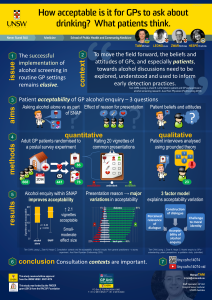 I presented this poster presentation (abstract and handout, PDF 1 Mb) at the International Medicine in Addiction 2015 (IMiA15) Conference, held in Melbourne 20-22 March 2015.
I presented this poster presentation (abstract and handout, PDF 1 Mb) at the International Medicine in Addiction 2015 (IMiA15) Conference, held in Melbourne 20-22 March 2015.
How acceptable is it for GPs to ask about drinking? What patients think.
Tam C. W. M.1,2, Leong L.2, Zwar N.2, Hespe C.3
1 General Practice Unit, Fairfield Hospital, South Western Sydney Local Health District
2 School of Public Health and Community Medicine, UNSW Australia
3 School of Medicine, Sydney, The University of Notre Dame Australia
Background
General practitioners (GPs) have expressed reservations to routine alcohol screening. Less is known about patient perspectives – consultation contexts are probably important, but these have not been well explored.
Aims
We sought to answer three questions regarding patient acceptability towards GP alcohol enquiry: (i) is it improved by asking within SNAP (smoking, nutrition, alcohol, physical activity)? (ii) how does it vary with the reason of encounter? and (iii) what are patient beliefs and attitudes?
Methods
We used quantitative and qualitative methods. All adult patients presenting to a general practice in a week in May 2014 were randomised to receive one of two postal questionnaires in a survey experiment. The number of “acceptable” alcohol enquiry ratings to 20 short narrative scenarios was the primary outcome measure. The intervention group rated the acceptability of SNAP enquiry, while the control group only rated alcohol enquiry.
Acceptability scores between groups were analysed. Individual scenario acceptability was explored descriptively. Questionnaire respondents were recruited for semi-structured interviews. We used grounded theory method – purposive sampling, data coding, constructing an explanatory model.
Results
144 questionnaires were returned (33% response). The difference between group means was 2.1 scenarios rated as acceptable (p = 0.016), a small-moderate effect (Cohen’s d = 0.40) favouring the intervention. There were large variations in acceptability between scenarios (range: 46 to 90%). We constructed a model that explained the influences on patient acceptability through three in-consultation factors – patient perception of the “relevance” of the alcohol dialogue, the “construction” of the dialogue, and the perceived “challenge” to moral identity.
Conclusion
Patient acceptability towards receiving GP alcohol enquiry appears sensitive to consultation contexts. Establishing the reason for enquiry within the context of the presentation, enquiring about other lifestyle factors, a collaborative approach to assessment, and respecting patient attitudes towards the delicate nature of the discussion may improve acceptability.
